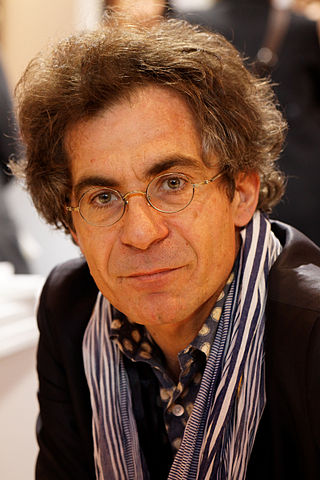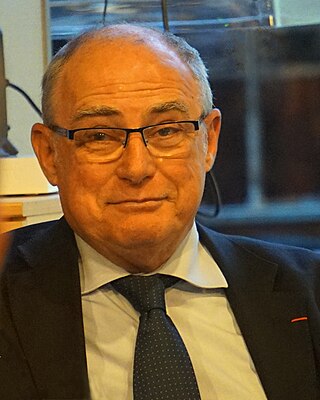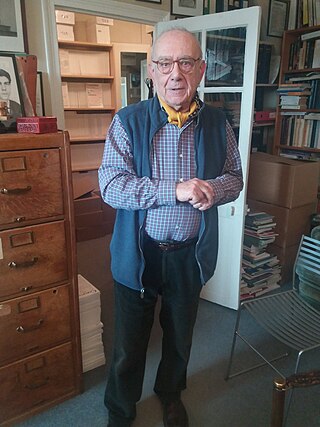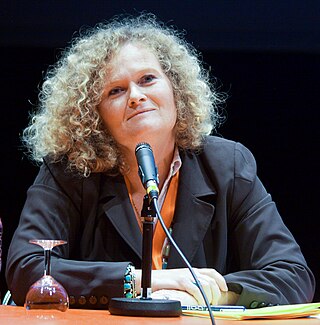Bernard Picinbono is a French scientist born in 1933 in Algiers. His scientific work focuses on statistics and its applications in optics, electronics, signal processing and automation.

Sir Michael Edwards, OBE is an Anglo-French poet and academic.

Érik Orsenna is the pen-name of Érik Arnoult a French politician and novelist. After studying philosophy and political science at the Institut d'Études Politiques de Paris, Orsenna specialized in economics at the London School of Economics. He was a close collaborator of François Mitterrand and held several government positions in the 1980s and 1990s. He is a member of the Conseil d'État, having been appointed in 1985. He was elected to the Académie Française on 28 May 1998. He won the 1990 International Nonino Prize in Italy. For Voyage au pays du coton he received the second prize of the Lettre Ulysses Award in 2006.
Pascal Lorot is a French economist and geopolitician.

Antoine Jean Marie Thévenard was a French politician and vice admiral. He served in the French ruling regimes of Louis XVI, those of the Revolution, Napoleon I and Louis XVIII, and is buried at the Panthéon de Paris. His son Antoine-René Thévenard, capitaine de vaisseau, was killed at the Battle of Aboukir whilst commanding the 74-gun Aquilon.

Jean Tulard is a French academic and historian. Considered one of the best specialists of Napoleon Bonaparte and the Napoleonic era, he is nicknamed by his peers "the master of Napoleonic studies".

The Institut français des relations internationales is a right-wing think tank dedicated to international affairs, based in Paris, France.
Danièle Hervieu-Léger is a French sociologist specialized in the sociology of religion.

Étienne Klein is a French physicist and philosopher of science, born in 1958. A graduate of École Centrale Paris, he holds a DEA in theoretical physics, as well as a Ph.D. in philosophy of science and an accreditation to supervise research (HDR).

André Miquel was a French Arabist and historian, specialist of Arabic literature and Arabic language.

Maurice Sartre is a French historian, an Emeritus professor of ancient history at the François Rabelais University, a specialist in ancient Greek and Eastern Roman history, especially the Hellenized Middle East, from Alexander to Islamic conquests.
John Scheid is a French historian. A specialist of ancient Rome, he has been a professor at the Collège de France since 2001.
Georges Charles Le Rider was a French historian, librarian and administrator, a specialist in Greek numismatics, who headed the Bibliothèque nationale de France in Paris. He had a filial relationship with Henri Arnold Seyrig who became and remained his mentor.

Maxime Simon Schwartz, born in June 1940 in Blois (Loir-et-Cher), is a French molecular biologist who has been a research director at the CNRS, a professor at the Pasteur Institute and Director General of the Pasteur Institute. He is a correspondant of the French Academy of sciences.
Maryvonne de Saint-Pulgent is a French musicologist and member of the Conseil d’État.

Nicolas Tenzer is a French civil servant, academic, writer, and editor. He was the editor of the journal Le Banquet (1992-2015) and is the founding president of the Centre d’étude et de réflexion pour l’action politique (CERAP), a position he has held since 1986. He was a director of the Aspen Institute from 2010 to 2015 and has acted as its treasurer and president. He is also a Non-resident Senior Fellow at the Center for European Policy Analysis (CEPA) in Washington, D.C.
Marie-Lise Chanin, is a French geophysicist, aeronomist, director of research emerita at the French National Centre for Scientific Research (CNRS), and author of works on the physics of the upper and middle atmosphere.

Francis Rapp was a French medievalist specializing in the history of Alsace and medieval Germany. An emeritus university professor, he was a member of the Académie des inscriptions et belles-lettres since 1993.

Jean-Claude Casanova is a French economist, educator and public intellectual with a lifetime involvement in French civic life. He was the chairman of the Fondation Nationale des Sciences Politiques between 2007 and 2016. A centrist in politics, he cofounded the journal Commentaire with Raymond Aron in 1978, and since then has been its editor and publisher (directeur).

Sylvie Brunel is a French economist and geographer, best known for her work for Action Against Hunger from 1989 to 2002, and her various publications in Que sais-je?. She was awarded the Legion of Honour in 2002.













